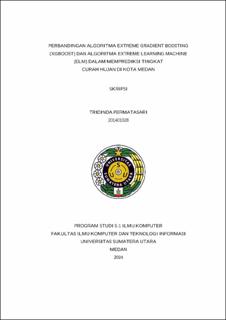| dc.description.abstract | Rainfall is a natural phenomenon that has a significant impact on various aspects of human life, including agriculture, water management and disaster mitigation, especially in the city of Medan. The city of Medan is one of the cities that is vulnerable to flooding. If it rains with high intensity, it is certain that most of the Medan area will be flooded. In addition, the tropical climate with intense rainy seasons also increases the risk of spreading diseases such as malaria. This research aims to compare the performance of two machine learning algorithms, namely Extreme Gradient Boosting (XGB) and Extreme Learning Machine (ELM), in predicting rainfall levels in Medan City. Data was taken from the BMKG online website at the Center for Meteorology, Climatology and Geophysics Region I starting from January 1 2022 – December 31 2023 in Medan City. This situation encourages the need to create appropriate rainfall prediction models in order to provide recommendations for appropriate action. Previous research on rainfall prediction has used models that have limitations, resulting in unsatisfactory performance. Based on the research results, the MSE, RMSE, MAE evaluation values obtained from the Extreme Learning Machine algorithm are lower and closer to 0 compared to the Extreme Gradient Boosting algorithm. The accuracy value obtained from the Extreme Learning Machine algorithm is 95.75%, while the accuracy value from the Extreme Gradient Boosting algorithm is only 95.03%. This research shows that the ELM algorithm is better used in predictions because it has smaller MSE, RMSE, MAE evaluation values and high accuracy values compared to the XGBoost algorithm. | en_US |


